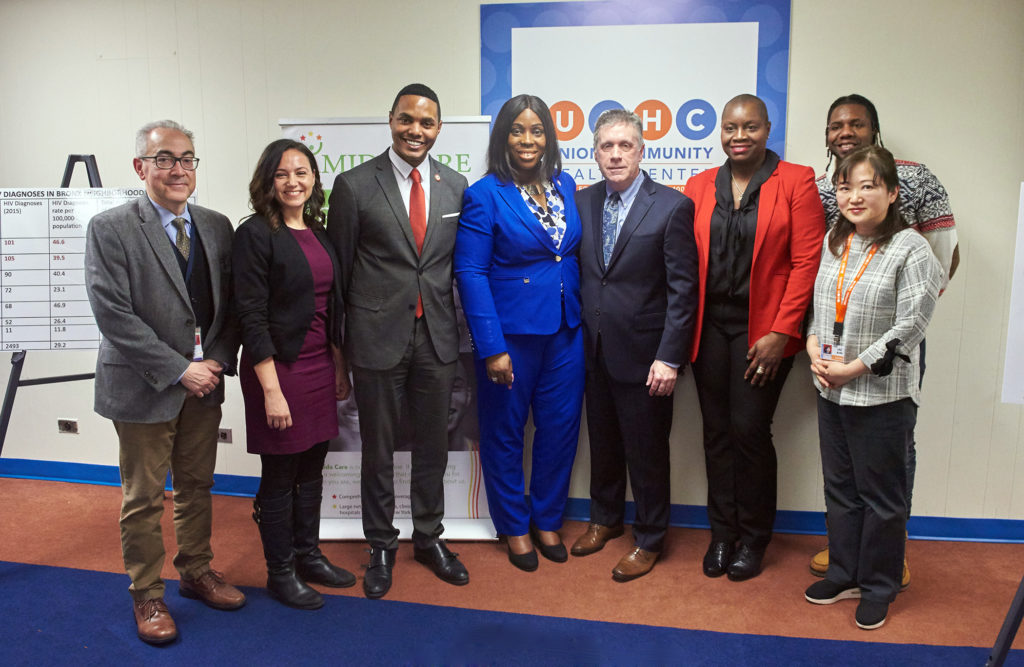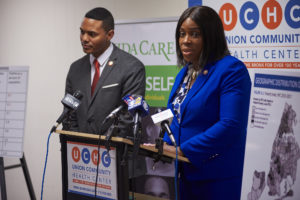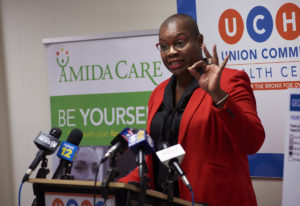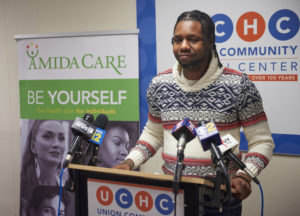NYC Council Member Ritchie Torres, NYC Council Member Vanessa Gibson, Amida Care, and Bronx Community Health Organizations Call for More Resources to Fight HIV on National Black HIV/AIDS Awareness Day
February 11 2020
African-Americans account for 43% of new HIV diagnoses nationwide, and 23% of all New York City residents with HIV live in the Bronx
Bronx, NY (February 7, 2020) — This morning, at a press conference marking National Black HIV/AIDS Awareness Day, New York City Council Members Ritchie Torres and Vanessa Gibson were joined by Amida Care, a not-for-profit New York community health plan, VIP Community Services, and community advocates at the Union Community Health Center in Fordham Heights to call for more resources to fight the HIV/AIDS epidemic in the Bronx and encourage residents to get tested for HIV and learn about HIV prevention and treatment.
Once the epicenter of the epidemic, New York is a national leader in the fight against HIV/AIDS. Between 2017-2018, New York experienced an 11% drop in the number of new HIV infections state-wide. The press conference celebrated the progress that has been made, but called for increased efforts to ensure that New York State reaches its goal of ending the epidemic by the close of 2020, which would make it the first state in the nation to do so.
Nationwide, communities of color have been disproportionately impacted by the HIV/AIDS epidemic. African Americans currently represent 13% of our country’s population but account for a staggering 43% of new HIV diagnoses, according to the CDC. In New York City, the Bronx has been deeply affected by the epidemic. Twenty-three percent of New Yorkers living with HIV (30,749 people) live in the Bronx, and the HIV diagnosis rates in the neighborhoods of Crotona-Tremont and Fordham-Bronx Park are about 1.5 times higher the citywide average.
At the press conference, Council Member Torres called for action to address these disparities. This includes supporting the New York City Department of Health and Mental Hygiene in expanding services offered at Sexual Health Clinics, such as expedited PrEP and PEP Start programs. Pre-exposure prophylaxis (PrEP) and post-exposure prophylaxis (PEP) are game-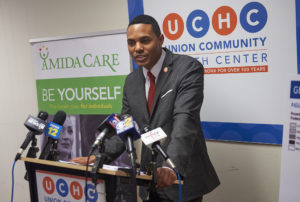 changing medications that are highly effective in preventing HIV. Torres also called for an increased commitment to the state’s End the Epidemic Initiatives, with a focus on health equity and the development of targeted services for communities placed at higher risk for HIV, as well as support for employment programs for people living with HIV to obtain living wage jobs in the health care field. Studies show that when individuals receive health services and advice from people with lived experience, they are more likely to access treatment. Maintaining support for Medicaid, which provides access to treatment for 40% of people living with HIV in New York State, is also critical to ending the epidemic. For every 2,000 new HIV infections prevented, we save $1 billion in future state Medicaid costs.
changing medications that are highly effective in preventing HIV. Torres also called for an increased commitment to the state’s End the Epidemic Initiatives, with a focus on health equity and the development of targeted services for communities placed at higher risk for HIV, as well as support for employment programs for people living with HIV to obtain living wage jobs in the health care field. Studies show that when individuals receive health services and advice from people with lived experience, they are more likely to access treatment. Maintaining support for Medicaid, which provides access to treatment for 40% of people living with HIV in New York State, is also critical to ending the epidemic. For every 2,000 new HIV infections prevented, we save $1 billion in future state Medicaid costs.
“While HIV rates have been declining overall in the state, they have been on the rise in Black communities and in the Bronx. In order to reverse this trend and end the epidemic, we must continue to fight for more resources, better policies, and direct outreach,” said Council Member Torres.
Council Member Gibson said, “We believe and we understand that we are a part of the solution. We need to dedicate dollars and resources to the amazing community-based organizations that serve our families and children. As we talk about progress, we need to remember that we must recommit ourselves to the work ahead. Nothing is easy, but the lives we save, the impact that we make on someone’s life will impact generations to come.”
“New HIV diagnoses in New York City have fallen below 2,000 per year for the first time since the beginning of the epidemic, but not all communities are seeing the same progress. We need to double down on our efforts to reach those that bear the brunt of the burden, particularly in LGBTQ communities and communities of color.
That’s why we are in the Bronx today to recognize National Black HIV/AIDS Awareness Day,” said Stephane Howze, Vice President of Member Experience at Amida Care. “We are thankful to the leadership of elected officials like Council Member Ritchie Torres and Council Member Vanessa Gibson for their steadfast support of New Yorkers living with HIV and their unwavering commitment to ending the epidemic in every community in our state.”
Octavio Liriano, MD, of VIP Community Services, said, “Thanks to Governor Cuomo, community-based organizations, advocates, public health officials, and medical researchers, New York State has made great progress to end HIV/AIDS epidemic. This information is encouraging, but to reach the goal we must continue to address the obvious disparities. Not enough New Yorkers know about or have access to PrEP. It’s important for health care providers to engage in sexual health conversations and prioritize discussions of PrEP with their clients. Every New Yorker should feel comfortable accessing testing. You can’t take care of yourself or loved ones if you don’t know your status.”
“I’ve been living with HIV for 16 years and I’ve been undetectable for 15 years. We hear the numbers and stats, but I’m actually living this. I want people to know that it is important that you take your medication and have a support team. Remember to give yourself self-love. People need to know that we have better treatment and you can live an active life. Let’s make sure we’re getting tested regularly. Let’s take advantage of the new medicine and health plans out here,” said Bronx resident and Amida Care member Jackie Johnson.
Jae Ahn, MD, Chief Medical Officer at Union Community Health Center (UCHC) said, “UCHC provides comprehensive access to HIV screening, testing, PrEP and PEP. We are proud to provide this to all our communities regardless of their ability to pay. We are committed to ending HIV/AIDS infections in the Bronx. Thanks to all our partners. Without you, we wouldn’t be able to do this.”

